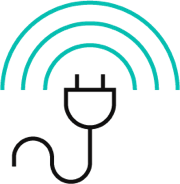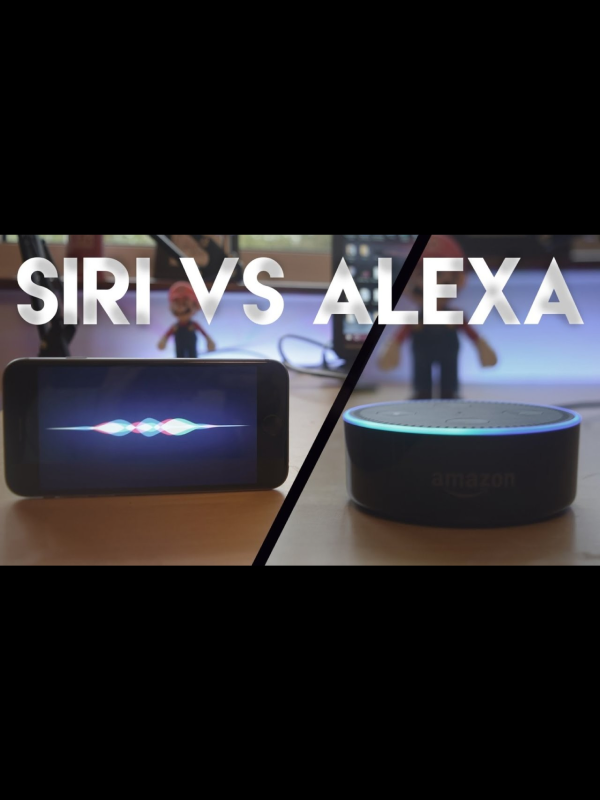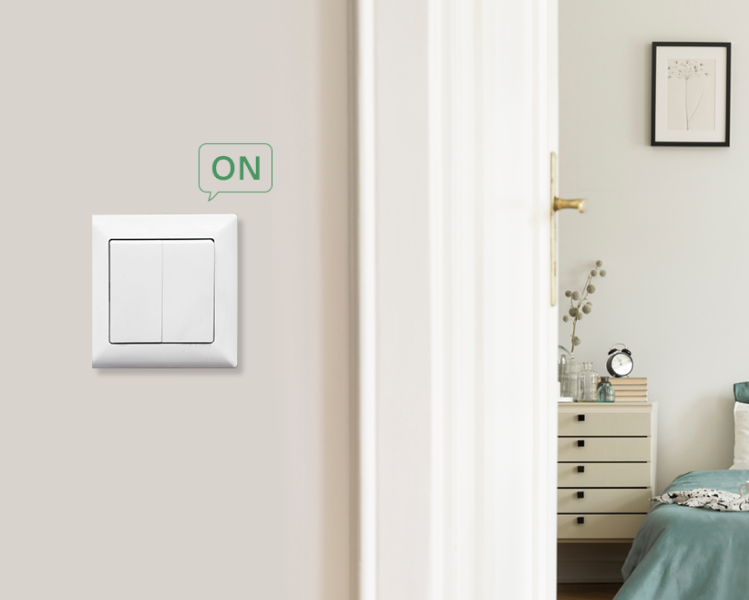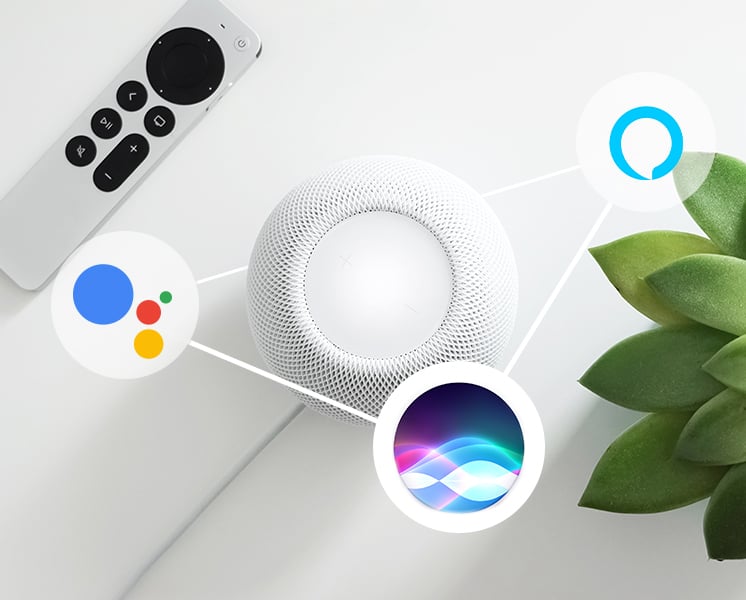Both Siri and Alexa have become a household name and are widely used for various tasks such as setting reminders, playing music, and answering questions.
However, there are several key differences between the two that set them apart. From their capabilities to their compatible devices, we will be covering it all in this post.
So, whether you are an existing user of one of these virtual assistants or are considering getting one, this blog will provide you with all the information you need to make an informed decision.
Let's dive in important features and popular commands and How it works in a blog
- What is Siri?
- What is Alexa?
- Who is the best assistant? Siri vs Alexa
- Buying Guide for Siri vs Alexa
- Best Smart Light Switch With Voice Assistant
What is Siri?
Siri is a state-of-the-art virtual assistant developed by Apple Inc. that utilizes cutting-edge voice recognition and natural language processing technology to interact with users.
The assistant is seamlessly integrated into a wide range of Apple devices including iPhone, iPad, Apple Watch and Mac, and allows users to accomplish a multitude of tasks through simple voice commands.
From setting reminders and sending messages, to making phone calls, providing directions and answering questions, Siri provides a convenient and intuitive interface for users to access the information they need and perform various actions with ease.
The assistant's advanced conversational capabilities enable it to understand and respond to natural language requests, making it an essential tool for anyone looking to streamline their daily routine and enhance their overall experience with their Apple device.
What is Alexa?
Alexa is a virtual assistant developed by Amazon, used in products such as the Amazon Echo and Echo Dot smart speakers. Similar to Siri, Alexa too, uses natural language processing and machine learning to perform a variety of tasks, such as answering questions, playing music, and controlling smart home devices. Users interact with Alexa by speaking commands or requests, which are then processed by the Alexa service and generate a response.
How Do They Work?
Siri vs Alexa both work by using a combination of advanced technologies to understand and respond to the user's voice commands. The main technologies they uses are:
- Voice recognition: At the heart of their functionality lies the technology of voice recognition. This technology allows the virtual assistants to understand the words and phrases we speak by converting our voice into text that the computer can understand.
- Natural Language Processing (NLP): But simply understanding the words we speak is not enough, which is where natural language processing (NLP) comes into play. NLP enables Siri or Alexa to understand the meaning of our requests, providing context and allowing it to respond in a way that's relevant to us.
- Machine Learning: They learn from our interactions and get better at understanding our requests and providing accurate responses. This means that the more you use Siri or Alexa the more it will understand you and the better it will become at assisting you.
- Cloud-based servers: All of this takes place on cloud-based servers, which process our requests and provide responses in real-time. This allows for faster and more accurate responses, ensuring that we get the information we need, when we need it.
Who is the best assistant? Siri vs Alexa
Siri vs Alexa are both popular virtual assistants and may work slightly in the similar ways, but they have some key differences. Let’s find out about each one of them:

Compatibility
Siri is exclusive to Apple devices, such as the iPhone, iPad, and Mac, while Alexa is available on a wide range of devices from Amazon, including the Echo line of smart speakers, as well as on other manufacturers' devices with Alexa built-in. If you’re going for compatibility, Alexa should certainly be preferred.
Shopping
Alexa's shopping apps are powerful due to strengthened backend support from Amazon. This allows users to order products directly from Amazon using their voice easily. Siri, on the other hand, is less powerful when it comes to shopping and may not be able to access the same level of information or functionality.
Global Presence
Alexa's presence is not as widespread as Siri's voice bot. Siri is present everywhere globally and is available in 20 languages, which makes it more accessible to a wider range of users. Alexa, on the other hand, is primarily available in the United States and the United Kingdom.
Responses
Alexa responds to queries with short and straight answers. This can be helpful for quickly getting the information you need, but it may sometimes provide less context or detail than you would like. On the other hand, Siri sometimes gives roundabout answers, which can be more informative and time-consuming.
Sound Quality
Alexa Echo speakers are not as advanced as HomePod when it comes to sound quality. The HomePod is packed with seven beam tweeters plus a high-excursion woofer, and it has an A8 chip to enhance sound quality, which makes it more capable of delivering high-quality sound than the Echo speakers.
Responses
Alexa responds to queries with short and straight answers. This can be helpful for quickly getting the information you need, but it may not always provide as much context or detail as you would like.
Siri, on the other hand, sometimes gives roundabout answers, which can be more informative but also more time-consuming.
Multi-User Mode
Alexa maintains voice profiles for varying users in multi-user mode. This allows multiple people to use the same device and get personalized responses. With Siri, voices of different users need to be recorded before engaging in personalized services.
In considering the choice between Siri and Alexa, it's important to take into account the various distinctions between the two virtual assistants. By assessing how well each aligns with your preferences and settings, you can make an informed decision that best suits your needs.
Buying Guide for Siri and Alexa
Here’s a buying guide to help you determine whether you should go for Echo or HomePod.
Android or Apple?
Well, this is perhaps the most important or only aspect you must consider while going for either of these. If you're out and out an Apple user, there’s no point going for an Alexa-supported device as you won't be able to connect your devices with them.
However, if you mostly rely on Android and your smartphone or other devices use this OS, you should definitely go with Echo.
Do You Value Compatibility?
If you’re a techie who loves compatibility, you'd find tons of options for Alexa. Alexa offers unbelievably large compatibility support and lets you get connected with many devices.
Do You Want to Keep Things Simple?
If you don’t mind getting your devices connected to a thousand other devices and keep things as straightforward as possible then Siri might be the answer.
Are You a Music Lover?
Finally, if you’re a music lover, we suggest you go for devices supporting Siri. As mentioned earlier Echo speakers are no match for the advanced HomePod sound system. Plus, Apple Music support makes Siri much more equipped than Alexa.
Best Smart Devices with Voice Assistant
EVVR Energy Monitoring Smart Plug & Relay
If you’re using Siri for your home you may consider using the EVVR Energy Monitoring Smart Plug. It’s a HomeKit-compatible device that allows you to control and automate your home appliances from anywhere using Siri voice commands. It will also support Alexa and Google Assistant in the near future, and no matter what gateway you use, you can choose our EVVR Smart Plug.
It can also monitor power usage in real time, allowing you to save energy and money. The device is easy to install and set up, providing overload and thermal protection for safety.
The unique split-type design allows the device to blend in with your wall outlets, and you can use the EVVR App to control and schedule your appliances remotely. Additionally, the relay version allows you to create your own DIY smart energy monitor for various electrical appliances, and control them with Siri.
Introducing the EVVR Energy Monitoring Smart Plug – currently crowdfunding with an exclusive invitation for you to explore its features and secure a remarkable 40% Super Early Bird discount. Join us in shaping an energy-efficient future. Limited-Time Pre-Sale Alert! Get smart with EVVR Smart Plug at 15% to 35% off discounts!
Best Smart Light Switch with Voice Assistant
The EVVR In-Wall Relay Switch is a great option for Alexa users looking for a smart light switch.
As it is compatible with Amazon Alexa, it allows you hands-free control of lights at home using voice commands. This feature is especially convenient for users who prefer hands-free and intuitive light control.
Additionally, it also supports hardwired 3-Way or 4-Way systems, so you can control the same light fixture from multiple conventional wall switches or control various light fixtures from one location, which can be beneficial for users with larger homes.
Bottle Line
Both Siri and Alexa are both prime examples of the cutting-edge technology available to the modern consumer. Both boast an array of capabilities, such as managing daily tasks, playing music, and controlling smart home devices.
However, the two assistants possess distinct characteristics that set them apart. Siri, being exclusively integrated within Apple products, offers a more cohesive experience for users entrenched in the Apple ecosystem.
On the other hand, Alexa, available on a more diverse range of devices, boasts a wider selection of third-party apps, or "skills."
Ultimately, it is a question of personal preference and the devices one currently possesses that should inform the decision of which assistant to adopt.
Regardless of the choice, the incorporation of either Siri vs Alexa into one's daily routine is guaranteed to bring a level of convenience and ease.
If there’s anything else you’d want to learn about these two systems or want to inquire more about Siri vs Alexa supported EVVR devices, do reach out to us and we’ll provide you with all the information you want!















